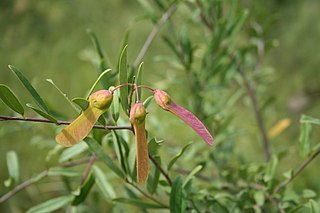
The Polygalaceae or the milkwort family are made up of flowering plants in the order Fabales. They have a near-cosmopolitan range, with about 27 genera and ca. 900 known species of herbs, shrubs and trees. Over half of the species are in one genus, Polygala, the milkworts.
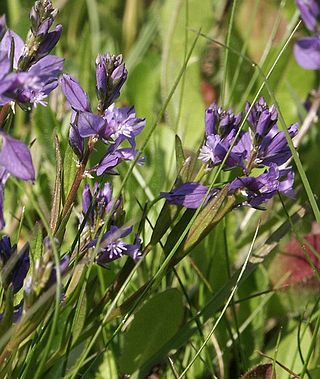
Polygala is a large genus of flowering plants belonging to the family Polygalaceae. They are commonly known as milkworts or snakeroots. The genus is distributed widely throughout much of the world in temperate zones and the tropics. The genus name Polygala comes from the ancient Greek "much milk", as the plant was thought to increase milk yields in cattle.

Polygaloides paucifolia, synonym Polygala paucifolia, known as gaywings or fringed polygala, is a perennial plant of the family Polygalaceae.

Quercus chapmanii, commonly referred to as the Chapman oak, is a species of oak that grows in the southeastern United States.

Rhinotropis acanthoclada, synonym Polygala acanthoclada, is a species of flowering plant in the milkwort family known by the common names desert polygala and thorn milkwort. It is native to the desert woodlands of the southwestern United States from Utah to the Mojave Desert. It is a small, bushy shrub spreading or growing erect and approaching one meter in maximum height. It is hairy in texture, the youngest twigs hairiest with a feltlike coat of short, whitish fibers. The lance-shaped or oval leaves are up to 2.5 centimeters long. Some of the twigs narrow to spines at the tips, especially in the inflorescences. The flowers are solitary or in clusters of up to 15. Each flower has five sepals, the lateral two white in color and spreading out like wings. The middle petal is keeled, with a flat tip protruding. The fruit is a capsule about half a centimeter long.

Polygala myrtifolia, the myrtle-leaf milkwort, is an evergreen 2–4 m tall South African shrub or small tree found along the southern and south-eastern coasts, from near Clanwilliam in the Western Cape to KwaZulu-Natal. It is a fast-growing pioneer plant, a typical fynbos component, and may be found on dunes, rocky places, along forest margins, beside streams, and in open grassland. It belongs to the milkwort family of Polygalaceae.
Hebecarpa rectipilis, synonym Polygala rectipilis, common name New Mexico milkwort, is a plant native to one county in New Mexico and to northeast Mexico. The type specimen was collected near the Town of Hillsboro in Sierra County, at an elevation of 1065 m.
Senega ambigua is a species of flowering plant in the milkwort family (Polygalaceae). It was first described in 1818 and is native to the United States and Japan.
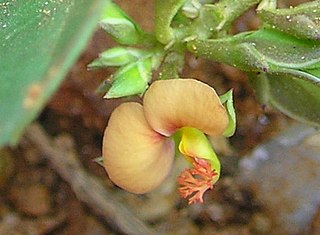
Polygala chinensis is a species of flowering plant in the family Polygalaceae. It is native to tropical Asia, China and Australia.
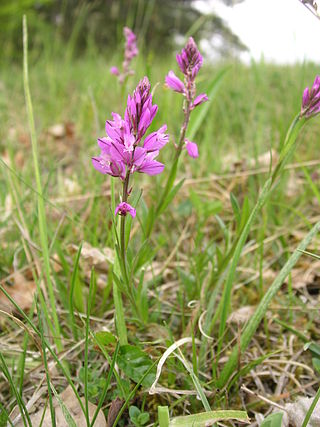
Polygala comosa is a species of flowering plant in the family Polygalaceae. It is endemic to most of Europe.
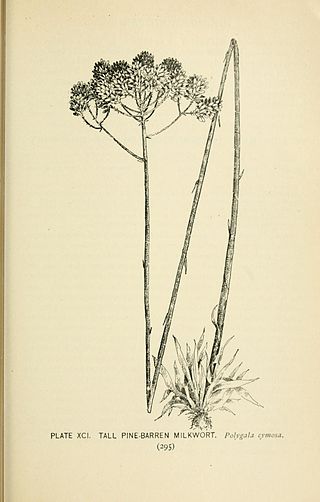
Senega cymosa, the tall pinebarren milkwort, is a species of flowering plant in the family Polygalaceae. It is endemic to the United States.
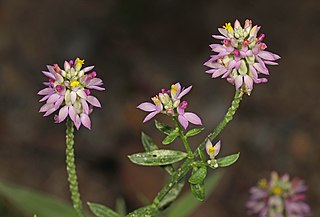
Senega mariana, the Maryland milkwort, is a species of flowering plant in the milkwort family (Polygalaceae). It is endemic to the southern and eastern United States. It is an annual with a height between 4 and 16 inches and it flowers between June and October.
Polygala sekhukhuniensis is a species of flowering plant in the milkwort family (Polygalaceae). It is endemic to South Africa.
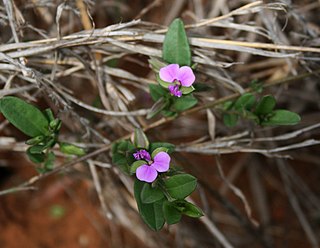
Polygala serpentaria is a species of flowering plant in the milkwort family (Polygalaceae). It is native to South Africa and Eswatini.

Polygala tatarinowii is a species of flowering plant in the milkwort family (Polygalaceae). It is native to China, Japan, Korea, Russia, Myanmar, the Philippines, Taiwan, and Vietnam. It is a herb that grows up to 15 cm (5.9 in) tall.
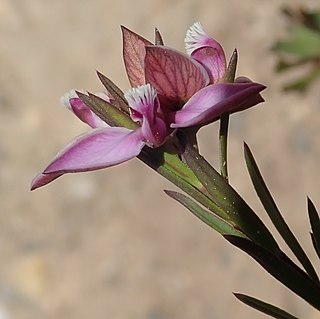
Polygala umbellata is a species of flowering plant in the milkwort family (Polygalaceae). It is endemic to the Cape Provinces of South Africa.

Polygala vayredae is a species of flowering plant in the milkwort family (Polygalaceae). It is endemic to the Pyrenees in Spain.

Polygala virgata is a species of flowering plant in the milkwort family (Polygalaceae). It is native to eastern and southern Africa, from the Democratic Republic of the Congo and Tanzania to South Africa and Namibia.

Rhinotropis is a small genus in the family Polygalaceae. It was separated as a genus from Polygala by J. Richard Abbott in 2011. It is native to the south and west of the United States and to Mexico.

Rhynchospora chapmanii, known by the common name of Chapman's beaksedge, is a member of the sedge family, Cyperaceae. It is a perennial herb, found in wetlands of the southeastern United States from North Carolina to Louisiana, as well as in Belize, Cuba, Honduras, and Nicaragua.
















